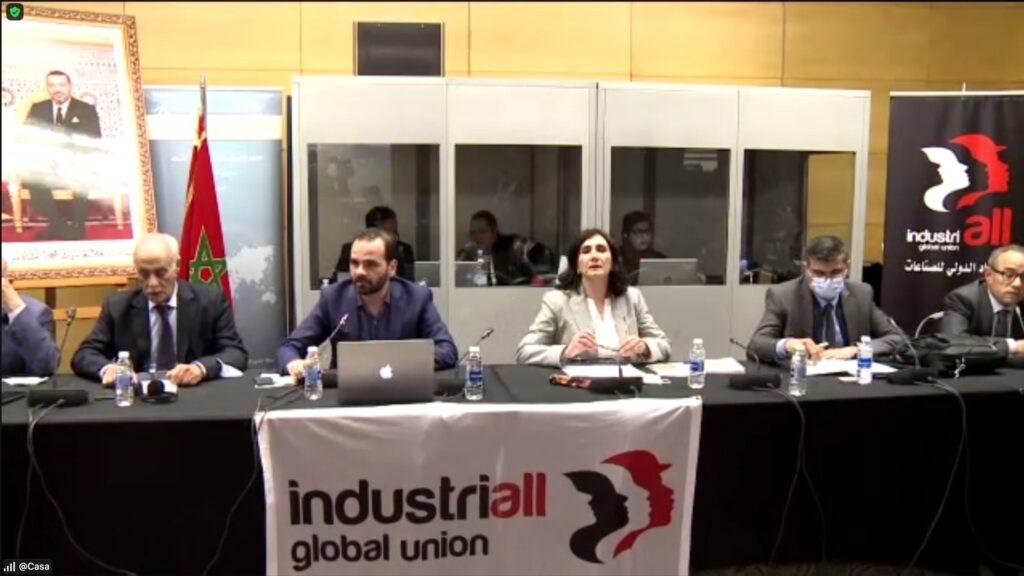Read this article in:
English
24 February, 2022On 23 February, IndustriALL organized a meeting on social dialogue in the textile, garment, shoes and leather sector in Morocco as part of the OECD Forum. The meeting was organized with the support of the Morocco OECD National Contact Point (NCP) and brought together unions, representatives of employers, and government officials.
The textile and garment sector is the primary industry in Morocco, employing about 200,000 people in the formal sector, and accounting for about a quarter of exports. The sector is growing as Morocco seeks to position itself as a fast fashion producer for the European market. Moroccan unions are using this momentum to build the foundations for social dialogue in the country.
The supply chain crisis caused by the pandemic has led European brands to question the current system of long and complex supply chains, with most garments currently sourced from a number of Asian countries. Brands are seeking to source production closer to the market. Tunisia and Turkey have already benefited from this, and sourcing is expanding in Morocco.
Representing employers, Fatima-Zohra Alaoui of the Moroccan Association of Textile and Apparel Industries (AMITH) said that Covid-19 had forced a fundamental rethink of the business model for the sector, and there was a new focus on sustainability: both from an environmental perspective, but also economically. It is essential to build a sustainable industry in the company.
Government representatives said that social dialogue is key – and that the primary responsibility lies with employers.
Union representatives stressed that collective bargaining agreements are the best way to ensure sustainable employment relations, and avoid incidents such as deaths which have happened in underground factories.
Ahmed Bahnis, national secretary of the Union marocaine du travail (UMT) federation said:
“We want to institutionalize social dialogue. Unfortunately, there is still a fight against social dialogue in the textile sector. It is necessary to mutually recognize the role of trade unions, which represent human capital, and aim for development of the sector and improvement of workers' conditions.”
Ahmed Hassoun, general secretary of IndustriALL’s Moroccan affiliate Syndicat National de Textile Habillements et Cuirs (SNTHC-CDT), said:
“We refuse to turn the dialogue into a mere consultation. The textile sector is characterized by fragility, and this was evident during the negative effects of the pandemic, especially in the informal sector. Through successful dialogue, we were recently able to sign the first company based collective agreement in the sector”
Ali Sarhani, representative of the private sector employers’ association Confédération générale des entreprises du Maroc (CGEM), said:
“Covid-19 has harmed the sector and there are major problems that have hindered investments, but respect for the law is necessary for stability and avoiding problems with workers, the state and taxes.”
Assia Besaad, the head of Morocco OECD NCP presented the NCP and its role in Morocco as well as OECD Due Diligence Guidance for Responsible Supply Chains in the Garment and Footwear Sector.
Abdelmajid Matoual, IndustriALL vice president for the Middle East and North Africa (MENA), welcomed the participation on behalf of the Moroccan affiliates and said that the meeting was timely as it coincides with resumption of the nation social dialogue sessions which started that week between the government and the national union centres.
Ahmed Kamel, IndustriALL MENA regional secretary, said:
“Today, social partners shared their initiatives and actions on mitigating the impact of the pandemic. Despite the difficulties, such initiatives and views have potentials in developing the social dialogue in the sector in Morocco in which we will continue to support and follow up with our Moroccan affiliates.”
